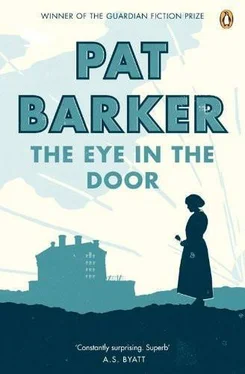Prior smiled and shook his head. ‘No. Thank you, but no.’
‘You don’t think you might regret it?’
Prior laughed. ‘Charles, if I get sent back — if, if, if, if — I shall sit in a dug-out and look back to this afternoon, and I shall think, “You bloody fool.”’
‘Well,’ Manning said, standing up. ‘I tried.’
In the hall a maid came forward carrying Prior’s cap and cane. Prior glanced at her: she was sallow-skinned, middle aged, about as old as his mother, he supposed. He stared at her uniform, remembering how he’d pressed his face into the armpits, smelling the careworn, sad smell. Manning was saying something, but he didn’t hear what it was. He turned to him and said, ‘Now I come to think of it, Spencer did mention other names.’
Manning said smoothly, ‘Thank you, Alice. I’ll see Mr Prior out.’
‘Winston Churchill and Edward Marsh.’
Manning gave an astonished yelp. ‘ Churchill? ’
‘Yes.’
‘Then he is mad.’
‘Yes, that’s what I thought.’ Prior walked to the door, then stopped. ‘He said Churchill and Marsh spent an entire afternoon beating each other’s buttocks with a plaited birch.’
‘Yes.’
‘What do you mean “yes”?’
‘Churchill was Home Secretary at the time.’
‘Oh, well, that explains everything.’
‘It was a new kind of birch.’ Manning looked impatient. ‘I don’t know the details, there’d been some sort of controversy about it. I think people were saying it was cruel. So naturally they —’
‘Tried it out on each other.’
‘Yes.’ Manning’s expression hardened. ‘They were doing their duty.’
‘What conclusion did they reach?’
‘I think they both thought they’d had worse beatings at school.’
Prior nodded, glanced round to make sure they were unobserved, then took hold of Manning’s pudgy cheeks and chucked them. ‘There’ll always be an England,’ he told him and ran, laughing, down the steps.
The reader may find it useful to have a brief outline of the historical events that occurred in 1917–1918 on which this novel is based.
Beattie Roper’s story is loosely based on the ‘poison plot’ of 1917. Alice Wheeldon, a second-hand clothes dealer living in the back streets of Derby, was accused and convicted of having conspired to murder Lloyd George, Arthur Henderson and other persons by poisoning. The poison, in the case of Lloyd George, was to be administered by a curare-tipped blowdart. The trial depositions are in the Public Record Office, Chancery Lane, and provide a fascinating insight into the lives of absolutist pacifists on the run, and the Ministry of Munitions agents who spied on them. Mrs Wheeldon was convicted on the unsupported evidence of such informers and sentenced to ten years’ hard labour, despite her insistence that the poison she had procured was intended for the guard dogs at a detention centre. After the war she was released, but, weakened by prison diet, hard labour and repeated hunger strikes, died in 1919.
Friends of Alice Wheeldon by Sheila Rowbotham (Pluto Press, 1986) contains a useful essay: ‘Rebel Networks in the First World War’.
In January 1918 the Imperialist (later the Vigilante ), a newspaper owned and edited by the MP Noel Pemberton Billing, carried an article entitled ‘The First 47,000’. It purported to be written by Pemberton Billing himself, but in fact the author was a Captain Harold Spencer, who claimed that he had been a British Intelligence agent at the time when he saw and read the Black Book in the cabinet noir of ‘a certain German Prince’.
In April this article was followed by a short paragraph entitled ‘The Cult of the Clitoris’, again purporting to be written by Pemberton Billing, and again written by Harold Spencer. This suggested that the list of subscribers to a private performance of Oscar Wilde’s Salome might contain many names of the 47,000. Maud Allan, who was to dance the part of Salome, sued Pemberton Billing for libel, since the paragraph clearly implied she was a lesbian.
The trial was presided over by Lord Justice Darling. Pemberton Billing defended himself. Having been identified early in the proceedings as one of the 47,000, Darling lost control of the court.
The star defence witness was Harold Spencer. In addition to giving free rein to his obsession with women who had hypertrophied and diseased clitorises and therefore could be satisfied only by bull elephants, Spencer alleged that many members of the Asquith War Cabinet had been in the pay of the Germans, that Maud Allan was Asquith’s wife’s lover and a German agent, that many high-ranking officers in the British army were Germans, and that persons who had the courage and patriotism to point these facts out were marooned on desert islands where they had to subsist on iron rations from submarines.
Lord Alfred Douglas, another defence witness, seized the opportunity of pursuing his personal dispute with Robert Ross, Oscar Wilde’s devoted friend and literary executor, identifying him as ‘the leader of all the sodomites in London’.
After six days of chaos in the courtroom and hysteria in the newspapers, Pemberton Billing won the case and was carried shoulder-high through the cheering crowds that had gathered outside the Old Bailey.
Later that year Harold Spencer was certified insane.
Robert Ross died of heart failure, on 5 October, aged forty-nine.
Pemberton Billing went on to have a distinguished parliamentary career.
In 1917 Siegfried Sassoon (1886–1967), after protesting against the war, had been persuaded by his friend Robert Graves to accept a Medical Board, which decided that he was suffering from a mental breakdown and that he should be sent to Craiglockhart War Hospital, Edinburgh. There he came under the care of Dr W.H.R. Rivers, FRS (1864–1922), the distinguished neurologist and social anthropologist. At Craiglockhart, Sassoon reached the conclusion that, although his views on the war had not changed, it was nevertheless his duty to return to active service, where he could at least share the suffering of his men.
After a period in Palestine he returned to France on 9 May 1918. On 13 July, returning late from a patrol, he was wounded in the scalp by a rifle shot from one of his own NCOs; he was then sent back to England, to the American Women’s Red Cross Hospital at Lancaster Gate. The fact that he was ill enough for Rivers to have found it necessary to sit up with him is recalled in a letter from Katharine Rivers to Ruth Head (unpublished letters of the Rivers family, Imperial War Museum).
Winston Churchill’s and Edward Marsh’s devotion to duty while at the Home Office is mentioned in Edward Marsh, Patron of the Arts: A Biography by Christopher Hassall (Longmans, 1959).












